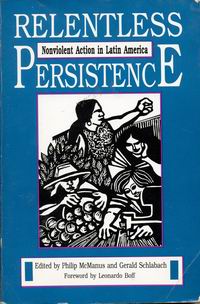
Relentless Persistence
Nonviolent Action in Latin America
McManus, Philip and Schlabach, Gerald (ed.)
Publisher: New Society Publishers
Year Published: 1991
Pages: 312pp Price: $16.95 ISBN: ISBN 1-55092-013-8
Resource Type: Book
Cx Number: CX4489
There is in Latin America a tradition of "firmeza permanente," relentless persistence, which has enabled the people to preserve parts of their culture during five centuries of conquest and oppression.
Abstract:
Essential reading for anyone committed to nonviolence or interested in exploring the degree to which it's practical against totally ruthless and unprincipled opponents. Latin American workers and peasants tend to respond nonviolently to the military terrorism launched against them by the wealthy national elites and the USA, partly due to lack of access to the weapons needed for armed resistance and partly to a tradition of "firmeza permanente," relentless persistence, which has enabled the people to preserve parts of their culture during five centuries of conquest and oppression. There is no great commitment to pacifism or familiarity with the work of King and Gandhi.
The most significant work for social change in Latin America today, the editors find, is that of the many thousands of community organizing projects that empower the poor and marginalized, often by encouraging them to create elements of an alternative economy. Such projects have their roots in community solidarity rather than in charismatic leaders.
Chapters on resistance in various countries by different authors have a variety of emphasis; the chapter on Guatemala is primarily a chronicling of atrocities, that on Argentina focuses on the Madres de Plaza de Mayo who took to the streets to protest the murder of their children; in Chile the mechanics of creating a popular urban movement at the neighbourhood level and starting alternative economic projects to feed the people are discussed, as is rural organizing in Peru.
Many nonviolent Latin Americans are convinced that, so long as the people remain conscious of their own identity, roots and collective power, they will find the appropriate means of confronting their oppressors when the time comes.
Table of Contents
Preface
I: Case Histories
1. Guatemala: When Spring Turned to Winter
2. Firmeza Permanente: Labor Holds the Line in Brazil
3. Miracle in Bolivia: Four Women Confront a Nation
4. The Nonviolence of Desperation: Peasant Land Action in Honduras
5. Argentina's Mothers of Courage
6. Uruguay: Nonviolent Resistance and the Pedagogy of Human Rights
7. Cultural Action for Liberation in Chile
8. Peru: Furrows of Peace in a Blood-stained Land
9. Nicaragua: Planting Seeds of Nonviolence in the Midst of War
10. Brazil: A Troubled Journey to the Promised Land
II: Testimonies
11. Good News in the Barrio: Nelsa Curbelo and Yanin Espinoza
12. To Accept the Enemy as a Challenge: The Ministry of Reconciliation
13. Uncapping the Bottle: Father Andres Giron and the Clamor for Land in Guatemala
14. To Discover Our Humanity: Adolfo Perez Esquivel
Epilogue: More Than One Task: North American Nonviolence and Latin American Liberation Struggle
Appendix A: The Spiritual Basis of Nonviolence
Appendix B: Preparing for Nonviolence
Resources
About the Resource Center for Nonviolence
About the Editors
Contributors Biographies
Glossary
Index
Subject Headings


